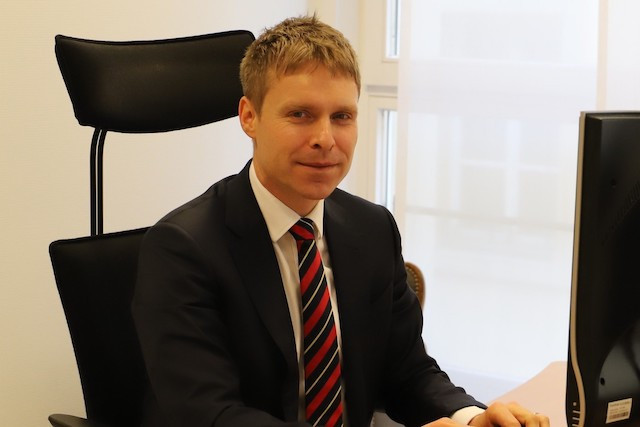Numbers don't say everything. However, in this case, they illustrate how much the administration of the Chamber of Deputies has seen its work increase with the onset of the health crisis.
"From January 2020 to now, we have had 81 plenary sessions, including 73 since the outbreak of the state of crisis," according to the Chamber of Deputies secretary general Laurent Scheeck. By way of comparison, even though the parliamentary year runs from October to October, there were 45 plenaries in 2019, 51 in 2018 and 43 in 2017. The number of sessions has therefore doubled.
The same goes for the meetings of the conference of presidents and the bureau of the Chamber: 73 meetings since the start of the crisis, versus 52 in 2019 and 31 in each of the previous two years. It should be noted that 32 of the 73 meetings took place in the unprecedented format which brings together the conference of presidents and the bureau of the Chamber, in order to receive "information on the situation from the prime minister, the minister of health and government.”
The health committee has obviously also been in great demand: 82 meetings since the beginning of 2020, compared to 20 in 2018. "In total, since the beginning of last year, there have been 969 committee meetings," according to the administration. Usually there are 500 to 600 annually.
More than 2,000 parliamentary questions, including 230 flagged as urgent, were asked. There had been 1,510 the year before, and only about half in previous years. Regarding urgent matters, there were 20 in 2019, 27 in 2018 and 9 in 2017.
The parliamentary administration therefore ran at full speed, with sessions, meetings and questions requiring a lot of upstream work. "We are happy to have remained operational permanently and to be still, and we will never complain of having too much work," says Scheeck, who did not doubt for a single moment that the teams, in all a hundred people spread over a dozen departments, would be able to rise to the challenge. “If I became secretary general of the Chamber only in March 2020, I have worked in the house for 10 years and therefore I know it well. The team is agile and never spares an effort. I will even say that we are at our best when we experience crises. We're a bit used to it. The Administration of course has a duty to be impartial, but we operate in a politicised environment, where crises, large or small, arise from time to time."
Logically "very proud of this collective effort", Scheeck remembers the many pitfalls that had to be overcome. "The main goal was to do the essentials, to do our daily administrative work so that the deputies could do their political work." In any case, the Administration had to reorganise itself very quickly, by switching to teleworking mode, "by setting up videoconferencing, by devising health protocols for agents and deputies, members of the government". It was necessary to rethink the plenary sessions, held for a time in three different rooms "with the president going from one to the other to seek the votes, with the duty to respect the prescriptions of the Constitution." Then there was the move to the Cercle Cité, "necessary, because for debates around texts that address fundamental rights, everyone must be gathered in the same place."
A legislative tsunami
Looking back, Scheeck sees three stages in the course of events. “First there was the state of emergency, which lasted for three months. The second step took place when parliament took back its powers. There, we had to deal with a legislative tsunami with 30 to 50 texts in three weeks, in particular regulations made which were to become laws.” But there was no alternative but to resume "because otherwise we would be in a legal vacuum. Once again, knowing the quality of the teams, I didn't worry.” The third stage, he calls it "living with covid", has been underway since the autumn, and the regulations come up on a regular basis.
In any case, the secretary general welcomes "this clear political will to have wanted to keep the democratic debate intact. And the administration has been instrumental in its implementation. The prime minister is a former parliamentarian and had this parliamentary reflex. In other countries, much has been done by decree. In Luxembourg, the debate remained.” Thanks also "to the President of the Chamber, Fernand Etgen (DP), who has always remained calm," but also to the Council of State "which has worked a lot." All of this evokes "a united effort between institutions to get through this crisis. And the Administration has therefore contributed to the maintenance of democracy."
Ways to be even better tomorrow
A crisis which will also have played the role of revealing what work and what doesn't work well, "because not everything was perfect." Scheeck sees several avenues for further improving the functioning of the administration and allow everyone to "work more efficiently." Thus, the committee service will be expanded, and the reports service redesigned. Decision-making processes will also be improved. A digital strategy was submitted last November. Without forgetting the expertise unit "with a view to improving the flow of information to deputies for their legislative and monitoring work" and for which three positions have been opened.
And if the extra work has "led to forms of fatigue", the crisis has also revealed the talents of many agents and "we will keep strong memories of moments of solidarity." Proud that his administration was permanently operational, Laurent Scheeck is also "of this capacity to find original solutions which at the same time respected all the constitutional requirements." But also, above all, "I am especially happy that we did not have any deaths neither among the administrative agents nor among the deputies. Unfortunately, this has not been the case in all countries.”
This article was originally published in French on Paperjam.lu has been translated and edited for Delano.
